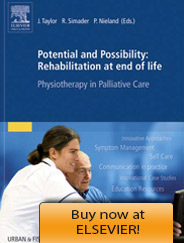

"Potential and Possibility: Rehabilitation at end of life.
Physiotherapy in Palliative care"
Eds: Taylor, Simader, Nieland
Foreword
Since 1995, when the Calman Hine report on Cancer Services was published, physiotherapy has been recognised as a core component of specialist palliative care. However, it has not been until now that a definitive and accessible textbook on physiotherapy in palliative and end of life care has been written.
The role of the physiotherapist is increasingly recognised as a key element in efforts to improve patients` quality of life and enable the maintenance of independent living in the face of advancing disease. Diagnostic skills mean that physiotherapists are frequently the first to detect conditions such as early spinal cord compression, making the difference between mobility and paraplegia. Investigation and referral allow mobility to be retained through immediate radiotherapy or surgery.
For patients` relatives, being taught how to help a patient move efficiently, stand from sitting or lying, or transfer from bed to chair safely will allow patients to live at home during their final illness. Appropriate breathing techniques can diminish the terror of severe dyspnoea. In these and many other areas, the positive enabling attitude of physiotherapy has brought about real service change and transformed patients` outlook from despair to realistic hope.
The combination of specialist rehabilitation expertise and excellent communication skills make the physiotherapist an indispensable support in the lives of patients who are desperate to maintain or regain independence in the face of progressing disease. Through team working, others are brought in to address issues that may have gone unrecognised or unheeded; so often, as these pages illustrate, the physiotherapist is able to unlock the unique potential of patient and carers as well as detect the unnoticed problems.
The real life case study examples, emphasising the importance of the patients` own views, bring to life the importance of physiotherapy in end of life care, adding quality to those final days, weeks or months of life. Cicely Saunders pointed out that the way that people die lives on in the memory of those left behind - the impact of effective end of life physiotherapy can endure for years after a person has died.
Baroness Ilora Finlay of Llandaff
Professor of Palliative Medicine, Cardiff University,
President of the Chartered Society of Physiotherapy





